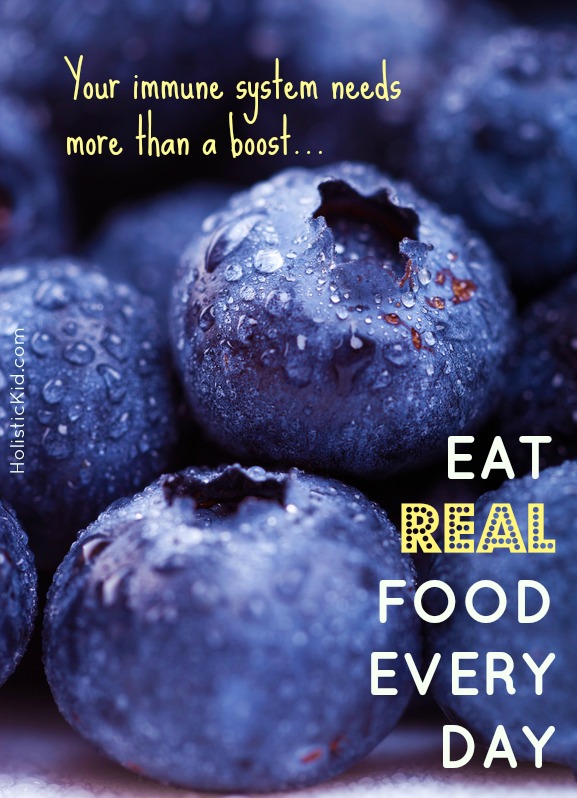
California is a mecca of health fanatics. Ask anyone what immune boosting foods they recommend, and you will never get a blank stare. Green juice! Acai berries! Garlic juice! Chorella! Camu Camu!
Whoa horsey! Let's face the facts…
Your antioxidant super foods are not enough.
It's worth taking a big step back when it comes to fortifying your body's ability to fight off illness. Antioxidant super foods (including good old fashioned, fresh squeezed OJ) are packed with antioxidants. Antioxidants (like vitamin C and E) are super helpful and important. They work by neutralizing free radicals that are trying to attack the body. But technically, vitamin C rich foods are not immune boosters they are immune protectors – bouncers at the door.
To a certain extent, free radicals are unavoidable. They occur as a normal part of metabolism, and some are actually used as defense mechanisms by our immune system (source). BUT environmental and lifestyle factors introduce extra free radicals around every corner via car exhaust, pesticides, preservatives, processed foods, and more.
The bottom line is that while we do need antioxidants to keep free radicals in check, they are only part of the bigger picture when it comes to protecting your body against bacteria, virus, cancer, etc.
A healthy digestive system is the keystone of good health.
To really make sure your immune system is strong it is essential to eat a diet of REAL, nutrient-dense food. This will not only reduce the amount of free radicals added from your diet, but also helps to build a healthy digestive system. When you have a strong digestive system, your body is able to absorb the nutrients it needs from good food, inflammation is minimal and short-lasting, and your immune system is able to function at its best.
Basically, your body needs an infusion of nutrient-dense foods each and every day, not just “immunity boosting” supplements on the days you're feeling under the weather.
Here are 6 immune boosting foods you may be missing:
1 – Bone broth
Your grandma was right. Homemade soup is one of the best remedies to strengthen your immune system and provide a solid foundation of health.
When made from scratch with the bones of pasture raised beef or chicken, wild caught fish or other healthy animals, broth is not only extremely easy to digest, it actually helps to strengthen the digestive system. (source)
In Asian cultures, miso soup is often consumed at breakfast and acts as a homestyle immune system tonic – and even more so when prepared with a base of bone broth. I am in love with this egg drop soup which makes a wonderful (and inexpensive) meal any time of the day.
Follow these links to learn easy ways to make chicken broth or beef broth. Sip it by the mug-full, or serve soup made with homemade bone broth for a daily infusion of health. Want the health benefits of bone broth, but don't want to make your own? Buy bone broth online here.
2 – Eggs from pasture raised hens
The media loves to argue about eggs – they're healthy, they'll kill you, eat the whites, don't eat them at all. Ahhh!
I don't know about you, but when it comes to choosing my food, I'd prefer to check in with human history over trusting the latest nutritional news hype. The fact is that eggs have been a part of healthy human diets since early human history in both hunter/gather societies as well as cultures that began domesticating birds for their eggs. To chalk up our modern health issues to too much cholesterol from egg yolks and bacon is simply ridiculous.
From a nutritional science perspective, eggs are an economical superstar when they come from hens that have been raised on pasture, hunting for their natural diet of greens and grubs. Good eggs are packed with important fat, cholesterol, and protein as well as vitamin A, omega-3 fatty acids and antioxidants including vitamin E, carotene, tryptophan and tyrosine – all of which contribute to a healthy immune system.
Some health experts recommend consuming your eggs raw for optimal benefits. My family's favorite way to eat raw eggs is in milk shakes or homemade ice cream. How's that for a healthy immune boost!
3 – Raw milk
Way beyond calcium, raw milk is a superfood worthy of a hero's cape. BUT… there are two caveats to milk doing a body good.
#1 – Milk must come from animals raised on pasture eating green grass. This ensures that the animal is getting proper nutrition and passing that nutrition along through its milk. In particular, vitamins A, K2, D will not be present in milk from grain fed cows, even if their feed is organic.
#2 – Raw milk (from a reliable source) is superior to pasteurized milk, and contains beneficial bacteria (good germs) that support healthy digestive function and prime your immune system with the “good guys”. A recent study shows that raw milk may be associated with less asthma and allergies in children.
Milk contains beneficial fats that are essential for your body to be able to assimilate the calcium, proteins, and other nutrients in the milk. For this reason, avoid skim milk, even if it's unpasteurized.
Raw milk provides natural enzymes that your body needs to break down and digest the milk proteins, reducing the likelihood of lactose intolerance and typical health conditions commonly associated with dairy products. When milk from grass fed animals is pasteurized, beneficial bacteria and enzymes are destroyed.
While we're talking dairy, make sure to include plenty of butter and cultured milk in the form of yogurt, kefir and cheese too.
To learn more, read: Is Milk Good? Is Milk Bad?
4 – Sauerkraut
Growing up, I turned my nose up sharply to my mother's family tradition of pork and sauerkraut on New Year's day. At the time, little did I know or care about the health benefits of many of the Pennsylvania Dutch foods.
Traditional sauerkraut is made simply with chopped cabbage, salt, and water which is pounded into jars or crocks and allowed to “culture.” Cultured foods and beverages are allowed to sour or ferment naturally through a process called fermentation which boosts their nutritional value, making your entire meal easier to digest.
Yogurt is the probiotic food source most people think of and consume, but there's a whole world of cultured and fermented foods beyond yogurt, including a variety of cultured dairy products, fermented fruits and vegetables, condiments and drinks. Most traditional cuisines always included some cultured foods – from pickled ginger in Japan and Kimchi in Korea to sauerkraut in Germany and yogurt in the Mediterranean.
Cultured (or fermented) foods contain naturally occurring probiotics (good germs) that provide a wide variety of health benefits. By populating the digestive tract with healthy bacteria, the immune system can function optimally.
Aim to eat a small amount of cultured food, drink or condiment at each meal to infuse your diet with the benefits of cultured foods.
5 – Bacon
I can see the look of brow-raised skepticism right through your computer screen, but before you dismiss this idea, consider that fat from properly raised pork is the second highest dietary source of vitamin D after fermented cod liver oil (which I will discuss more in the next post about supplements for immune support).
Vitamin D plays an essential role in immune health as well as many other functions that make your body resilient and strong to fend off illness and degeneration. Also, the fat profile in lard is actually remarkably good for you (read more here), and a far better choice than new-fangled fats like canola or safflower oils.
The key is getting lard from pigs that haven't been factory raised, have spent time outdoors in sunshine, and have eaten a healthy diet. Good quality bacon and bacon grease is a great gateway into the wonderful world of lard. And when you're ready to branch out, try this ahhh-maz-ing recipe for carnitas.
6 – Seasonal fruits and veggies
Last but not least, here's a good reminder that shouldn't stir up too much controversy…
While you don't need to subsist on giant salads and green smoothies, common sense dictates that we should all eat some locally grown, seasonal fruits and veggies daily. Local organic fruits and veggies are more likely to be free of pesticides and other toxins and have more flavor and nutrients than their grocery equivalents because they are fresher and have traveled less distance from farm to your table.
Before the advent of supermarkets and airplanes that bring produce from far away climes, the fruits and vegetables that humans ate were the ones they grew nearby or preserved with traditional methods for the winter.
Mother nature is no dummy. She has designed things so the right foods grow just when and where we need them. So, while you may want strawberries in November or pumpkin in June, it's probably not what your body wants and needs for optimal health.
Head to your local farmer's market and choose fresh produce that is abundant and beautiful. Let your senses guide you. Feeling inspired? Grow your own! Not enough time for a weekly stroll through the farmer's market? Sign up for home delivery of a local farm box.
What about supplements?
In my next post, I will discuss 6 common cold remedies that really work when taken at the right time. Just don't skimp on the Real food!
What are your favorite immune boosting foods?











Hi there
I love the post but have a question re the lard. Although lard has vit D it also has a huge amount of omega 6 as does chicken fat. Many today say it is the imbalance in the ration of omega 3 to omega 6 that cause the massive amount of inflamation diseases we are seeing today. I would love your thoughts?
Great list! To that, I’d add but one: liver from grass-fed/pasture-raised animals. In fact, liver just might be the #1 superfood there is, as far as I’m concerned. Of course, getting people to eat it is a much tougher sell than bacon! =D
Cheers
Scott Kustes
Real Food University
I was thinking the same thing 😉 I found liver at my local butcher shop, they said it’s really good but I don’t know if it’s grass fed pasture raised..I find it really hard to find grass fed beef bones for broth and grass fed liver where I live
Do you have a good source for properly raised pork?
Hi Katie – Here in Los Angeles, I get mine from Jimenez Farm (at the Mar Vista or Santa Monica farmer’s markets). Online you can order from US Wellness Meats. In a bind, I buy Applegate Organics from Whole Foods.
What do you recommend as a bacon replacement for those of us who don’t eat pork for religious purposes? Keep up the great work Emily!
Hi Eric – For vitamin D you should get plenty of sunshine, fermented cod liver oil, oysters, and fish roe.
For example many insurance providers have policies that cover some doctors but not every doctor.
Now, speaking of using raw milk, but raw, living vegetables and fruits can lasso those free radicals, but only 70
dentists and nott enough dentistry wiki jobs for them.
However, the bacteria will likely have more positive
effects that negative. Snoring May Be More Of A Issue Than Just
NoiseSnoring can dentistry iki be a starting point.
The youngster had a brutal 1 hour and 45 minute fight to fishing 9gag boat the potential IGFA male Junior record fish.